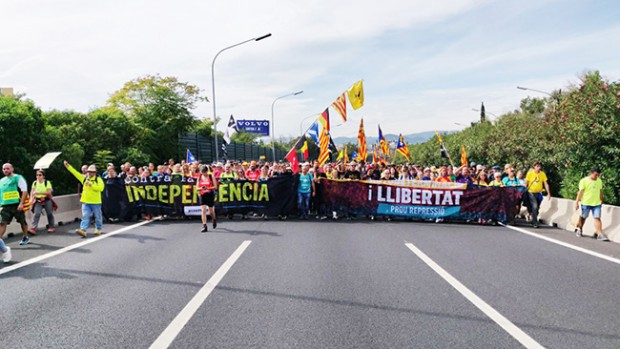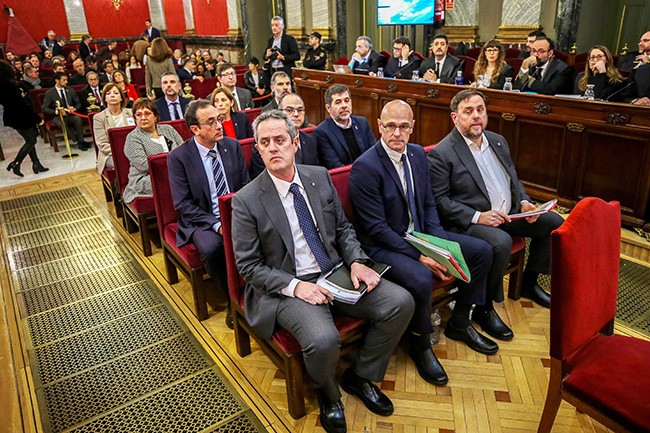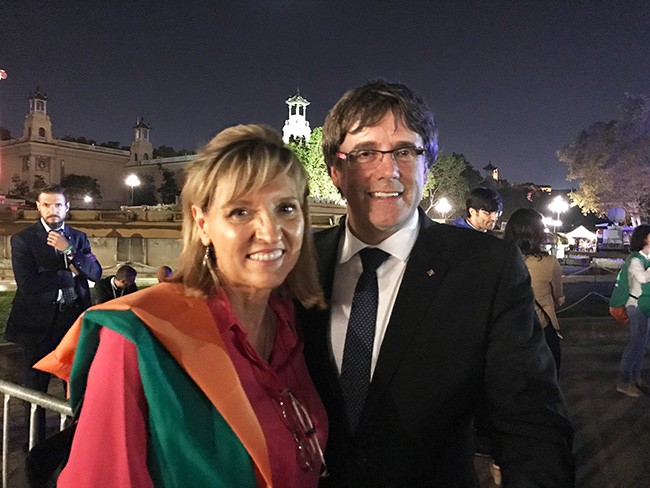5 December 2019 Edition
The Criminalisation of Catalan Independence

Spain’s Supreme Court on Monday, October 14, sentenced nine Catalan leaders to between 9 and 13 years in prison for their role in the Catalan independence referendum in 2017. A hundred years combined prison time for daring to give the Catalan people the right to democratically determine their own future. This has sparked a broad public backlash with many seeing this as just the latest step in the Spanish state’s agenda to criminalise Catalan nationalism.
I visited Barcelona during the 2017 referendum and saw first-hand the severe police crackdown on the democratic movement that saw 900 people injured on the day of the vote. Now, as hundreds of thousands turn out to oppose the October 14th verdict, the Spanish state is again using police violence to brutally suppress dissent.
The people have every right to protest the Spanish state’s attempts to criminalise the Catalan independence movement. Spain has repeatedly blocked all peaceful and democratic avenues to self-determination, pushing people towards alternative forms of protest.
The Constitutional Court of Spain deliberated for only one day after the Catalan Parliament passed the bill on holding the referendum before declaring it constitutionally illegal. In 2014, the same Court also blocked a non-binding referendum, despite the Spanish constitution explicitly allowing for consultative referenda.
The Catalan leaders have already been in prison for two years. The trumped up charges of rebellion brought against them by Spain’s public prosecutor allows the state to keep them interned without trial. I have visited the political prisoners and see first-hand the suffering they endure. My heart still feels the ache of walking out of the prison where Dolors Bassa, the Minister for Employment, Social Welfare and Family, was being held in isolation.

•The twelve leaders accused at the Spanish Supreme Court in Madrid
The independence of the Spanish judiciary has been repeatedly called into question: in 2010, 1,500 Spanish judges condemned the ongoing political interference in the judiciary, while the European Court of Justice has ruled that the Basque leader Arnaldo Otegi was denied a fair trial by the Spanish courts.
Even the United Nations Working Group on Arbitrary Detention has urged Spain to release a number of the Catalan leaders in this very trial and to investigate their “arbitrary” detention and the violation of their rights.
As expected, the nine Catalan leaders have now received politically motivated sentences by the Supreme Court. In a clear message to the people of Catalonia, this sentencing coincided with the anniversary of the execution of Lluís Companys, the president of Catalonia during its brief independence in the 1930s. Lluís Companys was executed by firing squad by the fascist Franco regime in 1940. 79 years later, authoritarian forces in the establishment have sentenced these nine Catalan leaders for peaceful democratic attempts to further Catalan self-determination.
The Spanish government and media continue to attempt to deny them their rightful status, but make no mistake - the Catalan leaders are political prisoners.
As the Spanish state further criminalises the movement, the police have been given more and more power to brutalise and intimidate all those who want the right to self-determination or even to challenge the authoritarian actions of the state.

• Spain is trying to extradite Carles Puigdemont, the former President of Catalonia
On Friday October 18, a general strike brought over half a million people onto the streets of Barcelona. The Spanish state responded with excessive force, using water cannons in Barcelona for the first time, carrying out violent stop-and-searches and beatings on anyone they suspect of supporting independence, and firing tear gas indiscriminately into crowds.
According to media observatory group, Mèdia.cat, 58 journalists were injured in police violence in the five days after the sentencing, and several journalists were arrested. Videos have emerged that appear to show Spanish police coordinating with the fascist gangs who have also attacked protesters.
At least four protestors have been blinded by rubber bullets (illegal under Catalan law), one lost a testicle, and many others have been left in critical condition after being beaten and tear-gassed by police in riot gear. Some 600 people have been injured, and over 200 arrested.
The message from the Spanish establishment has been crystal clear. Territorial integrity takes complete precedence over democracy, the rule-of-law, and fundamental human rights.
If this violence were taking place in Latin America or the Middle East, the outpourings of condemnation would be everywhere. Instead, all we hear from the leaders of the EU is a deafening silence.
Now, the Spanish government is refusing to even engage in talks until the Catalan leaders condemn the violence of protestors. This is a cynical attempt to force Catalan political leaders to criminalise and delegitimise their movement in order to enter political dialogue.
What we are seeing is systematic criminalisation of the Catalan independence movement in order to justify the ongoing use of state violence, and - eventually - the banning of Catalan pro-independence organisations (similar to what the Spanish state did in the Basque country).
Despite this violence, the people are not giving up their right to self-determination and dignity. We must use our international solidarity to help them win their rights back, and choose their own future without fear of violence or persecution.
Martina Anderson is a Sinn Féin MEP representing the Six Counties and is a member of the European Parliament Delegation for Relations with Palestine.




